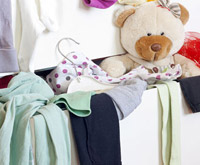Researchers at UCLA’s Center on Everyday Lives of Families (CELF) recently produced a fascinating book that studies 32 Los Angeles, middle-class, dual-income households. The takeaway from the study is no surprise, that American families have too much stuff. What was surprising was too much stuff increased the mothers stress level and/or depressed her mood.
The researchers measured the mother’s cortisol, or stress hormone, levels when they arrived home and then as they spent time around all their stuff. Mothers who self-described their homes as messy or cluttered actually had a distinct increase in their cortisol levels, which can cause them to feel stressed or have a higher rate of depressed mood. Interestingly, fathers in these homes did not experience a rise in their cortisol levels. Fathers were also more likely to notice recent home improvements rather than what needed to be done.
SO why do we accumulate so much stuff if living with it stresses us out? Well, the simple answer is because we live in a consumer culture. Shopping is one of our nations biggest pastimes. But it’s more complicated than that. Shopping, the gratification of a desire, raises our dopamine levels. Dopamine is our “feel good” hormone, so in other words, shopping feels good…but only in the short-term.
After the “high” of shopping comes the “low” of living in a cluttered house. It is easy to imagine how many people get caught up in the loop of fixing their “low” with a “high”.
Many researchers have documented this “shopper’s high”. The “high” comes in anticipation of owning and buying something new. Once we have it, the “high” goes away and we want a new “high” so we buy more stuff. Our brains are wired to always want more, which is a capitalistic market responds to by constantly inventing new things for us to purchase.
The problem is that accumulating more doesn’t make us happier. In fact, as the UCLA study documented, it’s the opposite. Not only that, but buying too much can add to one’s financial concerns and takes us away from something that actually does make us happier, quality time with family, friends, and ourselves.
The more stuff we have, the more time it consumes.
– Time spent buying it
– Time spent cleaning it
– Time spent getting rid of it
– Time spent looking for it
– Time spent sorting it
– Time spent working to pay for it and more
Not only does too much stuff stress us out and consume valuable time, it can also make us feel sad and deprived. The same neurons that crave the anticipation of shopping also raise our expectations. Once we have an item, we want the next bigger and better item we see in a magazine, store window or at our friend’s house. Our neurons keep raising the ante, but realistically not all of us can afford the next luxury handbag, shoes, Rolex, or speedboat, so those same neurons trigger a feeling of deprivation.
The UCLA researchers did not examine the stress on children, but all parents know that stress on parents is inevitably passed directly or indirectly onto their children. Not to mention that time spent on all this stuff could be used instead on quality time with children. Other clinical accounts that do acknowledge how too much stuff affects children cite “sensory overwhelm load”. Too many toys, too many choices, too much information can create cumulative stress, which can exacerbate “quirks” a child may have and lead to behavioral disorders. (This was based on anecdotal accounts not research studies.)
What to do:
– Stop buying so much stuff. Remind yourself it’s your dopamine craving the “high”.
– Work to simplify your life.
– Recognize that childhood is an unfolding experience, so give your kids enriching experiences, not stuff.
– If our brains crave new, exciting, and/or challenging activities (which shopping fulfills) help your brain get those experiences other ways. Take up something new, like ice-skating, or explore a different part of town.
– Use cash or debit cards, not credit cards.
– Window shop when stores are closed.
– Avoid shopping trips while visiting relatives and friends or during holiday seasons. Just the sight of new stuff can trigger a chemical release.
– Make a shopping list and buy only what is on it.
– Walk away from items and return the next day if you really want it.
More facts:
– Not all people’s brains are excited by shopping.
– Per capita wealth has more than doubled in many industrialized nations in the last 50 years, but happiness levels have flat lined.
– As countries become more prosperous, depression becomes more common.
– Shopping can be used not only as a reward, but also as a distraction.
– Shopping, like excessive drinking or eating, is a form of self-medication.
“Life at Home in the Twenty-First Century” is the booked cited in this article and produced by UCLA’s Center on Everyday Lives of Families.

